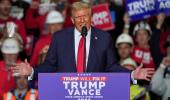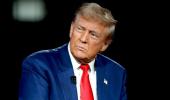The US Senate voted on Wednesday to confirm former Democratic Representative Tulsi Gabbard as Director of National Intelligence, CNN reported.

The vote was 52-48 mostly along party lines, though Republican Senator Mitch McConnell of Kentucky joined Democrats in opposing the confirmation, as per CNN.
Gabbard, one of US President Donald Trump's more controversial picks, faced concerns from several Republican senators over her lack of support for Ukraine; her shifting position on the Foreign Intelligence Surveillance Act's Section 702, a key surveillance and security tool; her 2017 meeting with former Syrian President Bashar al-Assad; and her past support for Edward Snowden.
However, key swing Republican senators, including Senators Susan Collins of Maine, Lisa Murkowski of Alaska and Todd Young of Indiana ultimately decided to back her confirmation.
On Monday night, Murkowski acknowledged in a statement that she still had "concerns about certain positions (Gabbard) has previously taken," but added that Gabbard "brings independent thinking and necessary oversight to her new role."
Senate Majority Leader John Thune defended Gabbard's nomination in a speech on the Senate floor Monday afternoon, in which he highlighted her military service and focused on her promise to "right-size" the Office of the Director of National Intelligence, as per CNN.
"I am glad that Ms. Gabbard plans to focus on identifying and eliminating redundancies and inefficiencies to restore the office to what it was originally designed to be," CNN reported Thune as saying.
He also said that he was "glad to hear" Gabbard refer to FISA Section 702 as essential, after she seemed to go back and forth on her position on the issue.
Gabbard is Trump's 14th nominee to be confirmed since January 20.
Her confirmation was a dramatic turnaround for a nomination that, from the start, has been among Trump's most divisive. A former Democratic congresswoman from Hawaii, Gabbard drew scrutiny from Senate Intelligence Committee lawmakers over her views on surveillance and a series of controversial meetings she held in Lebanon and Syria in 2017, including with then-President Assad.











 © 2025
© 2025